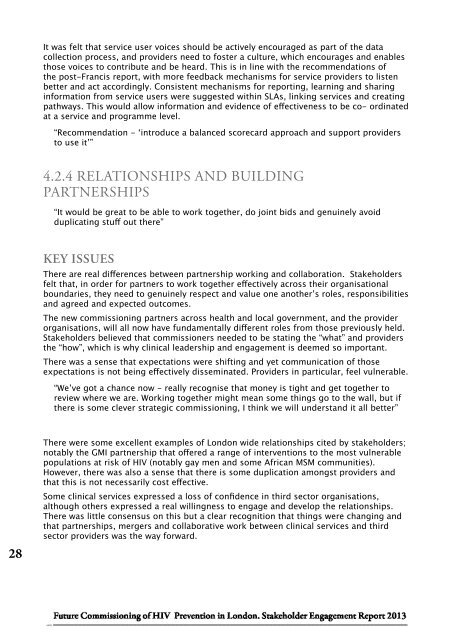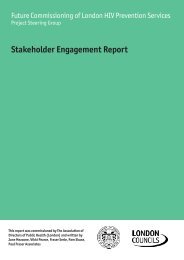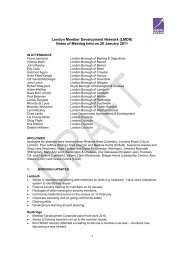Stakeholder Engagement Report - London Councils
Stakeholder Engagement Report - London Councils
Stakeholder Engagement Report - London Councils
Create successful ePaper yourself
Turn your PDF publications into a flip-book with our unique Google optimized e-Paper software.
It was felt that service user voices should be actively encouraged as part of the data<br />
collection process, and providers need to foster a culture, which encourages and enables<br />
those voices to contribute and be heard. This is in line with the recommendations of<br />
the post-Francis report, with more feedback mechanisms for service providers to listen<br />
better and act accordingly. Consistent mechanisms for reporting, learning and sharing<br />
information from service users were suggested within SLAs, linking services and creating<br />
pathways. This would allow information and evidence of effectiveness to be co- ordinated<br />
at a service and programme level.<br />
“Recommendation - ‘introduce a balanced scorecard approach and support providers<br />
to use it’”<br />
4.2.4 Relationships and building<br />
partnerships<br />
“It would be great to be able to work together, do joint bids and genuinely avoid<br />
duplicating stuff out there”<br />
Key issues<br />
There are real differences between partnership working and collaboration. <strong>Stakeholder</strong>s<br />
felt that, in order for partners to work together effectively across their organisational<br />
boundaries, they need to genuinely respect and value one another’s roles, responsibilities<br />
and agreed and expected outcomes.<br />
The new commissioning partners across health and local government, and the provider<br />
organisations, will all now have fundamentally different roles from those previously held.<br />
<strong>Stakeholder</strong>s believed that commissioners needed to be stating the “what” and providers<br />
the “how”, which is why clinical leadership and engagement is deemed so important.<br />
There was a sense that expectations were shifting and yet communication of those<br />
expectations is not being effectively disseminated. Providers in particular, feel vulnerable.<br />
“We’ve got a chance now - really recognise that money is tight and get together to<br />
review where we are. Working together might mean some things go to the wall, but if<br />
there is some clever strategic commissioning, I think we will understand it all better”<br />
28<br />
There were some excellent examples of <strong>London</strong> wide relationships cited by stakeholders;<br />
notably the GMI partnership that offered a range of interventions to the most vulnerable<br />
populations at risk of HIV (notably gay men and some African MSM communities).<br />
However, there was also a sense that there is some duplication amongst providers and<br />
that this is not necessarily cost effective.<br />
Some clinical services expressed a loss of confidence in third sector organisations,<br />
although others expressed a real willingness to engage and develop the relationships.<br />
There was little consensus on this but a clear recognition that things were changing and<br />
that partnerships, mergers and collaborative work between clinical services and third<br />
sector providers was the way forward.




